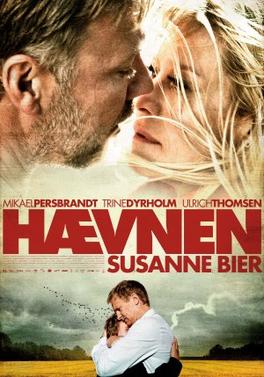"You don't go around beating people up. That's not the point," Anton says to his son. "What kind of world would we live in then?"
Although Anton tries to preach idealism to Elias, the fact of the matter is that there is too much negativity out there to skew his perception. Anton works as a doctor in a Sudanese refugee camp, and is exposed to the atrocities that the Sudanese people endure through disease, and namely, heinous and violent crimes that they commit on one another. Anton understand the malice in the world, and you can see it's with a sense of halfheartedness that he tries to keep his son innocent.
In a Better World is a Dutch film directed by Susanne Bier. The film is seen through the eyes of Anton, Elias, and a boy named Christian (William Johnk Juels Nielsen), who Elias befriends at school.
Bullying is a recurring theme in the film. It starts out on a smaller scale, with Elias being bullied by a fellow student, and then escalates when we watch Anton manhandled by a another father (Kim Bodnia) at a park after he tried to break up a scuffle between their infant children in the sandbox. But then we see it on possibly the most heinous scale, when Anton faces a moral dilemma at his refugee camp after a known war criminal comes in seeking aid on his injured leg.
Anton is married to Marianne (Trine Dyrholm), but the two are separated and contemplating a divorce. As if that wasn't enough negativity for one movie, Christian's mother has recently died of cancer, and as a coping mechanism, is irate at his father (Ulrich Thomsen), claiming that he "didn't do enough" to save his mother.
 |
| Markus Rygaard, left, and William Johnk Nielsen. |
The film is beautifully shot by Bier, who also wrote the story with Anders Thomas Jensen. For such an ambitious task -- attempting to encapsulate the loss of innocence among two young children -- the material is handled delicately and beautifully. The film tried to capture, in my opinion, almost what Terrence Malick's The Tree of Life tried to capture, but in a much more linear and focused way.
The acting across the board is sensational as well, primarily between the three main characters, portrayed by Persbrandt, Rygaard and Nielsen, but it is the latter who impresses the most. How he manages, as Christian, to shield off all emotions and make his character seemed deadened to the world is almost frightening to see.
Though it is littered with sorrow, the film doesn't aim to be cynical, but hopeful. Just like with Anton's preaching to his son at the middle of the film, it tries to teach us that although acts of kindness may not be rewarded as they should, that they are still the right way to life your life if you one day wish to be living in a better world.
~ Review by Ddubbs


No comments:
Post a Comment